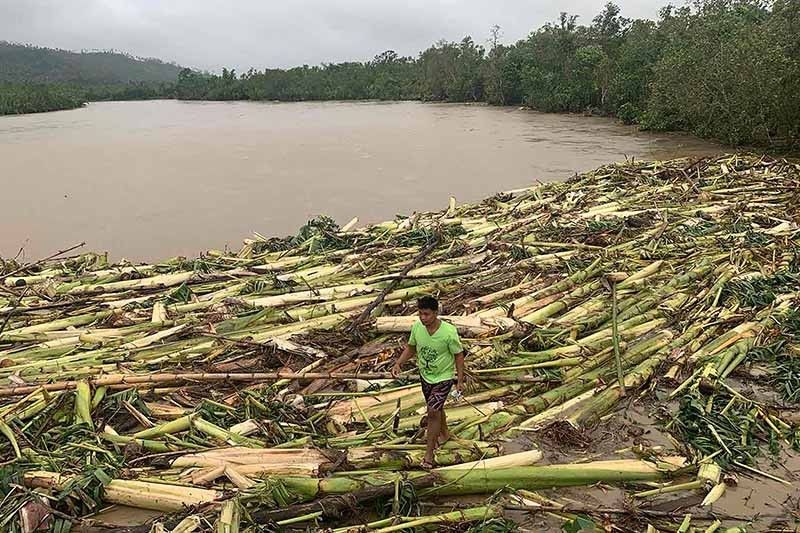Commentary: Changing minds on climate change

The average temperature on earth is now 1-degree Celsius hotter than it was in the pre-industrial era 1800s. However, half of that degree only happened in the last four decades and at this rate, the earth's temperature will continue to rise until it hits the critical 1.5-degree mark by 2050.
The UN Intergovernmental Panel on Climate Change identified the 1.5-degree marker as the tipping point beyond which the occurrence of extreme weather events, such as heatwaves, droughts and floods, will increase dramatically.
According to Dr. CP David, who recently spoke at a Stratbase ADR Institute's virtual event on the need for a proactive approach to climate resilience, the window to address climate change is closing. He warned that the window is now just 30 years and warned that not acting on climate change now may prove to be devastating for the planet. "It is up to us then to recognize this threat and seriously address the climate crisis," he added.
Despite the urgent need for climate action, David pointed out that the climate crisis is still not a "top-of-mind issue" and wrongly downplayed because of its slow onset nature.
Slow onset events (SOEs) include sea-level rise, increasing temperatures and forest degradation. As the name suggests, evolve gradually over the years, increasing in frequency and intensity.
The slow onset nature of climate change makes it difficult for people to understand the catastrophic risks. In fact, studies show that climate change is a distant issue for many and in more ways than one.
For instance, some see the impacts of climate change as the distant future's problem and view the extreme weather events occurring today as simply one-offs rather than the result of the earth's warming.
Perhaps others may feel that climate change has no direct effect on them and would rather concern themselves with more immediate economic or health issues. Others might recognize the need to address climate change but are unaware that solutions and best practices are closer to home than they think.
The lack of broader public understanding of climate change could also be one reason why many of the speakers during Stratbase ADR Institute's virtual event discussed climate resilience best practices related to data and information exchange.
On the one hand, Quirino Gov. Dax Cua and Dr. Mahar Lagmay of Project NOAH discussed using data to inform the public and policymakers of the very direct and immediate climate risks they face.
Cua, for example, shared how the accurate data was a big reason the local government of the Quirino province was given the Gawad-Kalasag National Award, the country's premier awards for Disaster Risk Reduction & Management.
According to Cua, the province of Quirino implement a Community-based Monitoring System to gather and disaggregate data to inform evidence-based planning, especially during calamities, and used Advanced Geographical Information System in designing prevention and mitigation plans.
Dr. Mahar Lagmay also highlighted the importance of using hazard and climate data to create more people-centered warning systems. According to Lagmay, technology is at a point where hazards can be mapped and key indicators can be tracked in real-time.
"Technology has advanced to such a degree that the cost of the sensors are very minimal. And we could densify the network of sensors that could give us data that would, in turn, make us have better decisions," Lagmay said.
On the other hand, Butch Meily of the Philippine Disaster Resilience Foundation (PDRF) and Nazrin Castro of Climate Reality Project Philippines discussed why it is essential for sectors to collaborate to mainstream actionable information and best practices on climate change.
According to Castro, the government, the private sector and civil society must converge expertise and resources to help the public overcome the lack of access to climate risk information, innovations and financial instruments. She furthermore recognized the need to break down silos work hand in hand to disseminate actionable information on climate change on the ground.
For Butch Meily, president of the private sector-led resilience initiative PDRF, multisectoral collaboration is also essential to raising awareness on climate change. One example he gave was PDRFs recently launched iADAPT training platform, a free resource that anyone can access to learn more about disaster preparedness, awareness and training.
PDRF represents a partnership of the Philippines' biggest business groups and is co-chaired by Ayala Corp. Chairman Jaime Augusto Zobel de Ayala, PLDT/Smart Communications Chairman Manuel Pangilinan and Cardinal Luis Antonio Tagle.
In an earlier statement, Zobel said that "now, more than ever, everyone must play a role in building resilience and mitigating risks as more devastating calamities arise in the future. I think we should be contributors of resilience and help minimize the contributions we make in worsening the situation."
Another example of multisectoral initiatives to share knowledge on climate change is the partnership between the non-government organization Save Philippine Seas and Globe Telecom. Together, they rolled out marine biodiversity programs in Boracay and Siargao to equip the community and business stakeholders to raise awareness for best practices on sustainability and biodiversity.
The slow onset nature of climate change has left the public indifferent to its looming risks. An extensive mainstream campaign that hammers on the direct repercussions to one’s personal existence based on science will change the passive mindset.
However, the window of opportunity to address climate change is closing. The urgency of this challenge requires us to look past our silos, share best practices and work together to take urgent action to combat climate change.
Paco Pangalangan is the executive director of think tank Stratbase ADR Institute.
- Latest
























